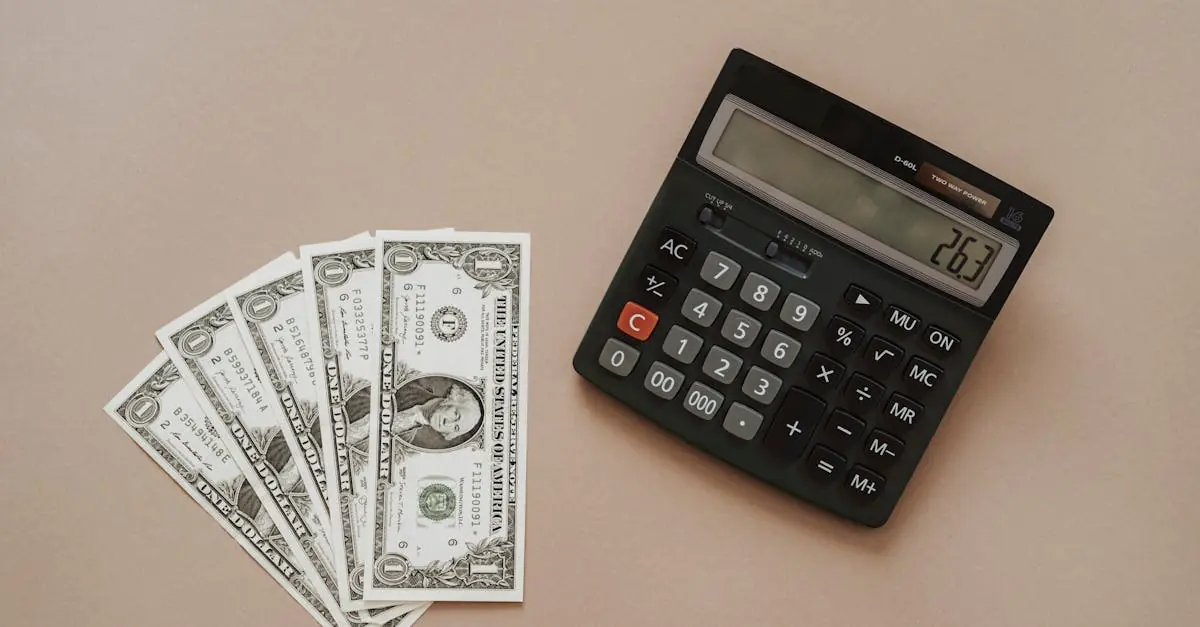Table of Contents
ToggleIn a world where avocado toast can cost more than a small car, mastering everyday budget basics isn’t just smart; it’s essential. Whether you’re a financial whiz or still trying to figure out how to save your pennies, understanding the fundamentals of budgeting can transform your wallet from a bottomless pit into a well-organized treasure chest.
Understanding Everyday Budget Basics
Everyday budgeting involves tracking income and expenses to ensure financial stability. Setting clear financial goals simplifies budgeting by providing direction. He or she can categorize expenses into fixed, variable, and discretionary categories for better clarity.
Fixed expenses include recurring bills like rent or mortgage payments, while variable expenses like groceries fluctuate month to month. Discretionary spending refers to non-essential items including entertainment and dining out.
Creating a budget serves as a roadmap for managing finances effectively. Utilizing tools like spreadsheets or budgeting apps enhances tracking capabilities. By regularly monitoring spending, individuals can identify areas where cuts are necessary.
Establishing an emergency fund is critical for unexpected expenses and should ideally cover 3 to 6 months’ worth of living expenses. Allocating a portion of income to savings each month fosters long-term financial security.
Adjusting the budget as financial situations change maintains relevance and effectiveness. Tracking spending patterns over time reveals trends that inform better decision-making. By sticking to a well-planned budget, individuals achieve their financial goals while avoiding debt.
Understanding the basics of everyday budgeting equips individuals with essential skills for managing finances effectively. Emphasizing the importance of regular reviews and adjustments helps maintain control over one’s financial situation.
Importance of Budgeting
Budgeting plays a critical role in financial management. It offers a roadmap toward financial stability and goal achievement.
Financial Stability
Achieving financial stability relies on effective budget management. Tracking income and expenses helps identify spending patterns. This awareness allows individuals to categorize expenses, such as fixed bills and variable costs. Fixed expenses typically include rent, utilities, and insurance, while variable expenses encompass groceries and transportation. Building an emergency fund, usually containing 3 to 6 months’ worth of living expenses, provides a safety net for unexpected events. Allocating specific amounts for savings enhances overall financial health. Regularly updating budgets in response to changing financial circumstances strengthens this stability. Consistent budgeting fosters accountability and promotes better financial decisions.
Goal Setting
Setting clear financial goals is vital for successful budgeting. Individuals often establish short-term goals, like paying off credit card debt, alongside long-term objectives, such as purchasing a home. Prioritizing these goals ensures focused efforts. Defining specific, measurable, achievable, relevant, and time-bound (SMART) goals enables clarity and progress tracking. It’s essential to adjust goals based on financial circumstances, so they remain realistic. Allocating budgeted amounts toward these targets helps in maintaining motivation. Regularly reviewing and refining goals supports ongoing financial success, making it easier to stay on the path to achieving them effectively.
Key Components of a Budget
Understanding the key components of a budget enhances financial management. Focusing on these areas ensures a strong foundation for achieving financial goals.
Income Tracking
Income tracking involves monitoring all sources of earnings. Consider including salary, freelance work, and passive income. Recording this information helps create a clear picture of available funds. Using spreadsheets or budgeting apps simplifies this process. Regularly updating income records keeps budgets accurate. Ensuring all sources are accounted for allows for better financial decision-making.
Expense Categorization
Expense categorization plays a crucial role in budget management. Identify fixed expenses, such as rent or mortgage payments, which remain constant monthly. Variable expenses, like groceries and utilities, fluctuate based on consumption. Discretionary expenses cover non-essentials like dining out or entertainment. Assigning expenses to these categories aids in understanding spending habits. Reviewing these categorized expenses enables adjustments to align with financial goals.
Savings Allocation
Saving a portion of income establishes financial security. Setting aside 20% of monthly earnings is a common recommendation. Prioritizing savings for emergencies builds a fund covering 3 to 6 months of living expenses. Long-term savings should also be a focus, supporting retirement or major purchases. Creating a separate savings account promotes discipline and prevents overspending. Regular contributions improve overall financial stability and peace of mind.
Tips for Creating an Effective Budget
Creating an effective budget requires thoughtful planning and regular updates. These strategies can enhance budgeting success when implemented.
Setting Realistic Limits
Setting realistic limits helps prevent financial stress. When individuals evaluate their income sources, they establish clearer expectations for their spending capacity. Fixed expenses often cover necessities like housing and utilities, while variable expenses fluctuate based on usage. Discretionary spending, such as dining out and entertainment, also requires careful consideration. Allocating specific amounts to each category ensures that spending aligns with financial goals. Assessing personal habits can illuminate areas needing adjustment. By sticking to these limits, individuals maintain better control over their finances.
Reviewing and Adjusting Your Budget
Reviewing and adjusting your budget ensures it remains relevant. Regular check-ins—ideally monthly—provide insights into spending patterns and highlight necessary changes. Individuals should analyze differences between budgeted and actual expenses, identifying areas for improvement. Adjustments might include reallocating funds among categories or increasing savings contributions. Life changes, such as job shifts or family needs, often necessitate budget reevaluations. Keeping communication open with family members fosters collaboration and accountability. By staying proactive, individuals can adapt their budgets to evolving financial situations and goals.
Tools and Resources for Budgeting
Budgeting tools and resources simplify financial management. They allow individuals to track spending and improve savings effortlessly.
Apps and Software
Budgeting apps provide convenience and features tailored to personal finance management. Popular options like Mint, YNAB and PocketGuard offer user-friendly interfaces that help monitor expenses in real-time. Users can categorize spending and set alerts for bill payments, ensuring they stay on track. Many apps also sync with bank accounts, making it easier to assess overall financial health. By using these platforms, individuals can gain insights into their habits and make necessary adjustments promptly.
Printable Templates
Printable templates serve as effective tools for those who prefer physical documentation. Budgeting worksheets, which can be customized for specific financial situations, guide users in organizing their finances. Many websites offer free templates that include sections for income, expenses and savings goals. These resources promote accountability by providing a tangible way to track financial activities. Regularly updating printed budgets encourages individuals to remain aware of their spending habits and long-term objectives.
Mastering everyday budgeting is a vital skill that empowers individuals to take control of their finances. By understanding income sources and categorizing expenses, they can make informed decisions that lead to financial stability. Setting clear financial goals and regularly reviewing budgets ensures that spending aligns with those objectives.
Utilizing budgeting tools can simplify the process and enhance accountability. Whether through apps or traditional methods, staying organized is key to navigating financial challenges. Ultimately, a well-structured budget not only supports immediate needs but also paves the way for long-term financial security and success. With commitment and discipline, anyone can transform their financial landscape.





